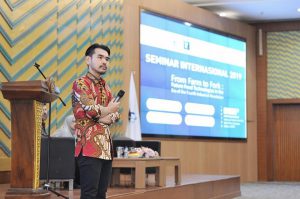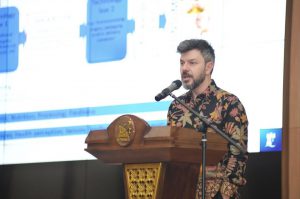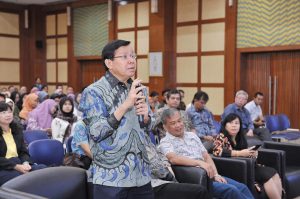April 25, 2019, by pressoffice
Developing food security and sustainability with Indonesian partners
 As the only UK University invited by the Ministry of Research, Technology and Higher Education (RISTEKDIKTI) in Indonesia to contribute to a World Professor’s Lecture, the University of Nottingham had shared best practices and knowledge in future food technologies and food security at a time when the country faces rapid transformation in the era of the 4th industrial revolution.
As the only UK University invited by the Ministry of Research, Technology and Higher Education (RISTEKDIKTI) in Indonesia to contribute to a World Professor’s Lecture, the University of Nottingham had shared best practices and knowledge in future food technologies and food security at a time when the country faces rapid transformation in the era of the 4th industrial revolution.
Professor Serafim Bakalis, Professor in Food Process Engineering, Dr Chiew Foan Chin, Associate Professor in Biosciences and Dr Bagus Muljadi, Director of Indonesia Doctoral Training Partnership (IDTP) at the University addressed to nearly 300 representatives from local universities, industry and policy makers at the workshop. Challenges and developments on food technologies and sustainability from a global perspective were discussed with leading academics from Bogor Agricultural University (IPB).
The Nottingham team displayed a broad range of research capabilities covering post-farm technologies and processing as well as crop improvement, nutrition and sustainable food system. This new partnership on food between the UK and Indonesia is particularly encouraging considering Future Food, one of the six Beacons of Excellence at the University shares a similar vision with Indonesian partners and addresses the challenge of feeding a growing population in a changing world.
As a champion for knowledge exchange in food security between the two countries, Professor Ali Ghufron Mukti, Director General of Resources at the Ministry emphasised the government’s priority to transfer technology and knowledge from academic and industrial partners in order to best support farmers in producing sustainable food supplies.
Dr Bagus Muljadi said: “At IDTP, we aim to provide the platform for knowledge exchange between the UK and Indonesia. Indonesia is the world’s largest producer of palm oil as well as a leading global producer of other high value commodities such as cocoa, rubber and coffee. On the other hand, UoN is the home of world leading research in agriculture and food which could compliment the country’s sustainable development goals. The collaboration aims at achieving the country’s self-sufficiency of sustainable food production.”

No comments yet, fill out a comment to be the first


Leave a Reply